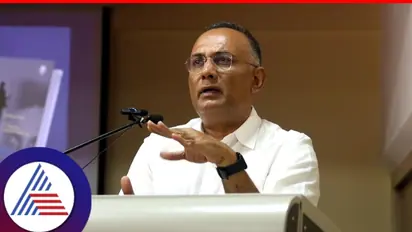'Brahmin Samaj's Veer Savarkar used to consume beef': Karnataka Minister Dinesh Gundu Rao sparks row

Synopsis
Karnataka's Health Minister Dinesh Gundu Rao stirred controversy by stating that Veer Savarkar consumed and defended meat, portraying him as a fundamentalist influenced by European ideas. He contrasted this with Mahatma Gandhi's vegetarianism and respect for Indian culture, igniting debate over their historical legacies.
Karnataka's Health Minister, Dinesh Gundu Rao, has stirred controversy with his remarks regarding Veer Savarkar, a prominent figure in Brahmin society. At the launch of 'Gandhiji Hanthaka,' an event organized by Jagrita Karnataka and Aharnishi Prakashan to mark Gandhi Jayanti, Rao claimed that Savarkar not only consumed meat but also defended the practice publicly.
Rao emphasized that while Savarkar is often viewed as a modernist, he also exhibited fundamentalist traits. "Fundamentalism is not part of our culture; it has its roots in Europe," he stated, suggesting that Savarkar's ideologies were influenced by European thought.
'CM's wife Parvathi's decision in returning sites is apt': Karnataka HM G Parameshwar
Rao further elaborated on Savarkar's relationship with cow slaughter, asserting that Savarkar did not oppose it and had been known to eat beef. In stark contrast, he praised Mahatma Gandhi, noting the leader's commitment to vegetarianism and his deep respect for Indian culture and traditions.
'CM Siddaramaiah and gang conspired against me to send me to jail': HD Kumaraswamy
The minister's comments have ignited a debate about the legacies of these historical figures and their impact on contemporary society. As the discussion unfolds, many are reflecting on the cultural narratives surrounding both Savarkar and Gandhi, especially in the context of modern India's diverse beliefs and practices.
This statement from Rao not only highlights differing perspectives on Savarkar's life but also underscores the ongoing discourse about cultural identity and historical interpretation in India today.
Stay updated with the Breaking News Today and Latest News from across India and around the world. Get real-time updates, in-depth analysis, and comprehensive coverage of India News, World News, Indian Defence News, Kerala News, and Karnataka News. From politics to current affairs, follow every major story as it unfolds. Download the Asianet News Official App from the Android Play Store and iPhone App Store for accurate and timely news updates anytime, anywhere.